
On hearing of last week's coup in Mauritania, I thought of journalists who attended workshops I conducted there in February 2007 and their high hopes for democracy following decades of military rule.
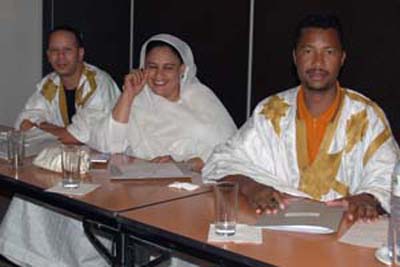 Mauritanian journalists undergo training (Abu-Fadil)
Mauritanian journalists undergo training (Abu-Fadil)
The New York-based Committee to Protect Journalists (CPJ) issued an alert Friday calling on the new government, which seized power in a bloodless coup, to respect press freedom after at least one journalist complained of being harassed.
Reporter Ahmed Ould Neda, 23, with independent news Web site Al-Akhbar said he was filming an anti-government demonstration when he was arrested and told to hand over his tape to security forces, which he refused to do, the CPJ said.

Al Akhbar logo
General Mohammad Ould Abdul Aziz overthrew Sidi Mohamed Ould Cheikh Abdallahi, the first elected president since 1960, after the latter had ordered Abdul Aziz and three other top generals fired.
The generals opposed several of the president's appointments, including men discredited under a former administration.
Ironically, Abdel Aziz was behind the ousting of another president in 2005 and had helped bring Abdallahi to power.
These events reminded me of the 37 workshop participants' enthusiasm to learn new journalistic techniques and their eagerness to understand the conceptual, historical, political, ethical and social underpinnings of free and responsible media.
The workshops in Arabic and French also exposed them to matters such as critical thinking, developing and protecting sources, effective analysis, investigative reporting, and, how to cover political campaigns and elections a month before their first truly democratic presidential balloting.
The journalists watched the 1970s classic "All the President's Men" (with French and Arabic subtitles) to reinforce their need to question authority and hold public officials accountable -- a seemingly new concept to them. It served the dual purpose of introducing them to investigative and elections coverage skills.
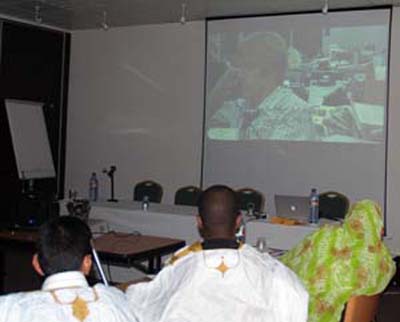
Watching "All the President's Men" (Abu-Fadil)
Many of the journalists had never been formally trained and we concentrated on the profession's basics -- principles and practices taken for granted in Western media.
According to its 2008 annual report, advocacy group Reporters Without Borders monitored coverage of the presidential campaign in February and March 2007 by Mauritania's public media and hailed efforts to respect complex rules of fairness and balance in reporting on different candidates.
Aside from some numbers irregularities, Reporters Without Borders praised the commitment and effort of public media's management as well as the pragmatism and constructive spirit of the country's new media regulatory body, the High Authority for Press and Broadcasting (HAPA).
I was gratified back then to know that government-operated and private newspapers published in Arabic and French such as Al Chaab (The People), Horizons, Journal Officiel, Le Calame (The Pen), L'Eveil-Hebdo (Weekly Awakening), Rajoul Echaree (Man on the Street) and Akhbar Nouakchott (Nouakchott News) had made progress.
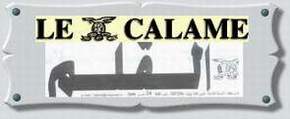
Le Calame logo
State-run Mauritanian radio and TV with programs in Arabic, French and several local languages saw some improvements given their meager resources.
The Mauritanian TV station I visited in the capital Nouakchott was a poorly maintained modest operation that seemed a throwback to broadcast media decades ago.
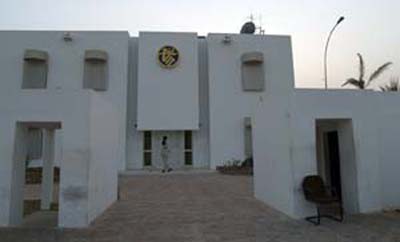
Mauritanian TV (Abu-Fadil)
Relatively independent news agencies and online media have emerged in recent years but their resources are also rather limited. Converged newsrooms are the stuff of dreams in that country.
In May 2008, a newly established "Mauritanian Press Federation" grouped 23 independent newspapers in a bid to raise their visibility vis-à-vis the government, seek to reinforce media freedom, and further the cause of democracy.
In March 2006, the National Consultative Commission to Reform Print and Broadcast Media drafted an 87-page report aimed at revising existing media-related legislation and developing the entire sector in keeping with domestic, regional and global political/economic changes.
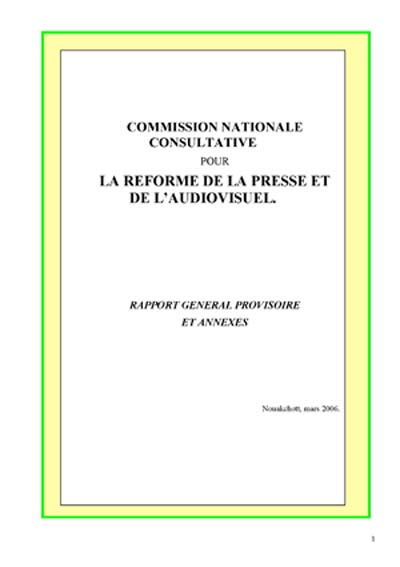
National Commission Report (Abu-Fadil)
But all is not rosy. Reporter Mohamed Ould Abdel Latif of Al Hurriya (Freedom) newspaper was arrested last month following an article he wrote about three judges who allegedly took hefty bribes to free accused drug smugglers.
Media reports said the arrest had raised questions about the future of press freedom, notably since recent months' events had led observers to warn of a possible reversal of civil liberties.
Other journalists for state-run media had been fired when they refused to toe the official line by shedding light on corruption within government ranks and by constantly pointing to the thorny issue of Mauritania's relations with Israel.
To date only Arab countries Egypt and Jordan have official diplomatic ties with Israel, while Qatar hosts an Israeli interests office in Doha. Mauritania took a similar plunge (prodded by Washington) but the population at large and the media have been critical of the move given Arabs' revulsion at Israeli occupation of Palestinian lands and harsh treatment of Palestinians.
The short-lived transition to democracy and media freedom -- despite promises from the new ruling junta to preserve them - face an uncertain future in the 398,000-square mile country of three million that has seen fast GDP growth since 2001.
Mauritania, a mostly arid desert Arab Muslim state viewed as a natural bridge between Sub-Saharan Africa and Arab North Africa, was recently added to the continent's oil producing countries and is considered a magnet for foreign investors.
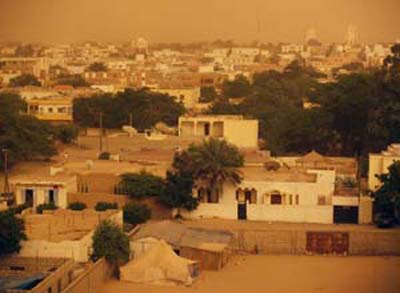
View of Nouakchott (Abu-Fadil)
It has attracted Canada's First Quantum Minerals Ltd. to mine some 35,000 tons of copper a year, according to media reports, and boasts large deposits of iron ore, accounting for a sizeable chunk of its exports.
Prior to the discovery of oil in 2006, Mauritania relied mostly on drought-prone agriculture while its coastal fishing grounds are threatened by over-exploitation, according to a BBC News country profile.
Journalists and analysts say it could be years before benefits from these natural resources trickle down to most citizens, given the country's historical instability and military coups, corruption, tribal loyalties and fears of foreign companies' plans to siphon much-needed and untapped wealth.
They also say the media will, again, fall victim indefinitely to these vagaries.
Mauritanian media sites:
www.saharamedia.net
www.alakhbar.info
www.tvm.mr
http://calame.8k.com
www.cyberforum.mr/presse/nexpress
